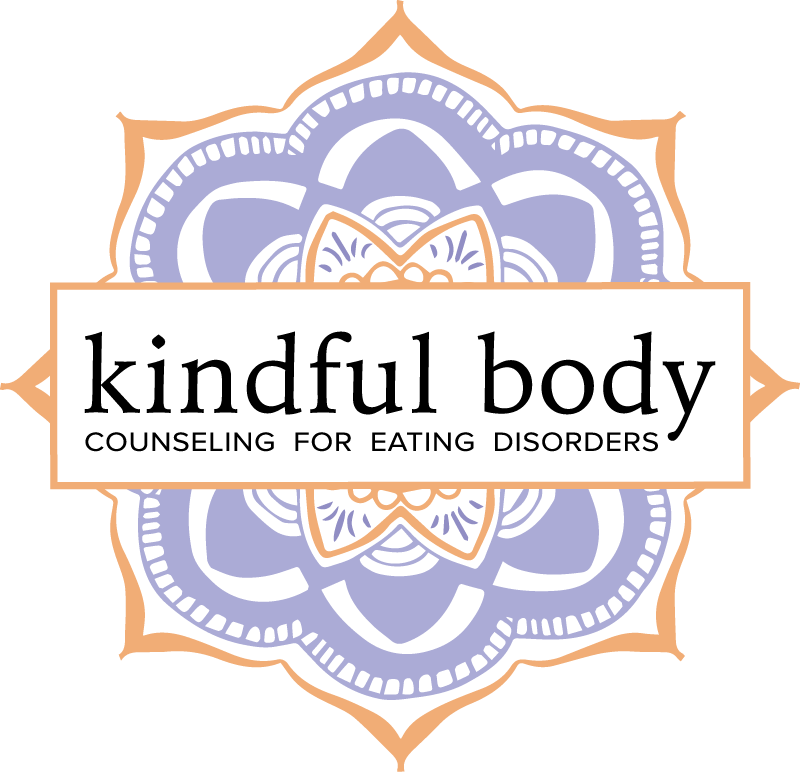Eating Disorders Are Not Superficial
Jasmine Dunckel, a therapist at Kindful Body, wrote the following informative blog about oppression and eating disorders:
People in oppressed social positions (and those confronting and resisting oppression on their behalf) have long used food as a form of protest. Not only is food one of the first objects a person has access to, there is also meaning attached to the way food is accepted and refused in different cultures. To finish a plate may connote appreciation or greed. To make sounds or eat silently may connote respect or comfort. the mother smiling when the baby opens their mouth, the mother frowning when the baby pushes the spoon away. Food, having it or not having it, is the first expression of communication and control for many.
Consider that which our culture of colonization seeks to control above all else - emotions. The pious, the reserved, the stoic. The one who does not succumb to emotions. Rising above emotions to think logically is a much respected and encouraged ability in the colonized world. This deliberate encouragement of disconnecting from emotional experience was an effort to justify the horrible treatment applied to the indigenous and enslaved. Put your emotions aside and you can see how “logical” colonization is.
The culture that aims to control emotions creates children desperate to control their experiences. Desperate times lead to desperate measures and for some this includes turning to the use of food as a form of expression to express that which remains unnamed. The behaviors around food become a mode of communication to communicate that which is unaccepted by the dominant culture. In the earliest stages of childhood, children are given the message that something is wrong with the way they feel. That child grows to see not only is there something wrong with how they feel but there might even be something wrong with the culture they exist within.
The child sees people without homes on the street and feels the pain as no one looks the unhomed person in the eye and they walk past as if that person does not exist. The child sees the limited roles for women and the litigation against their autonomy. The child sees the way we treat our pets while other animals are used in labs and abused in slaughtering houses. The child sees no garden, has planted no seeds, has watered no leaf and is told to eat healthy.
America is a country built on stolen land by stolen bodies and we wonder why our children struggle to feel okay. Violence is perpetrated on bodies of color and non-conforming bodies at an alarming rate as our children are told “we are all equal.”
Americans are independent and we pull ourselves up by our own bootstraps. Americans are perpetually productive and rest is an indulgence so what child would stop and ask for help? American children are inadvertently discouraged from seeking support and acknowledging the pain they feel. It is no wonder then that the eating disorder becomes a survival strategy to numb pain, feel success, avoid emotions and disconnect from the disrespected and devalued body. It is no wonder then the eating disorder becomes the bullhorn from which the child amplifies their protest against an unjust and unacknowledging world.
Fortunately there is a simple (yet not easy) fix. We as Americans must live up to the expectations America was seemingly founded on. As Thomas Paine said, “When it can be said by any country in the world, my poor are happy, neither ignorance nor distress is to be found among them, my jails are empty of prisoners, my streets of beggars, the aged are not in want, the taxes are not oppressive, the rational world is my friend because I am the friend of happiness. When these things can be said, then may that country boast its constitution and government.” We, as a country may not rest until these are our lived principles and only then can we truly facilitate the healing that our bodies desperately need.
Kindful Body believes eating disorders are a social justice issue, and we can’t help people heal their relationship with their bodies without looking at the oppression, discrimination and trauma that people experience as a result of their race, size, sexual-orientation, gender, abilities and ethnicity. You can read about our commitment to more equitable and inclusive eating disorder treatment in our Vision statement.
Jasmine Dunckel is committed to helping clients heal from systemic and personal trauma and reintegrate their whole and complete self.
If you or someone you love is struggling with an eating disorder and trauma, please contact us to schedule a 15 minute consultation to explore how Jasmine or another therapist at Kindful Body can help.
